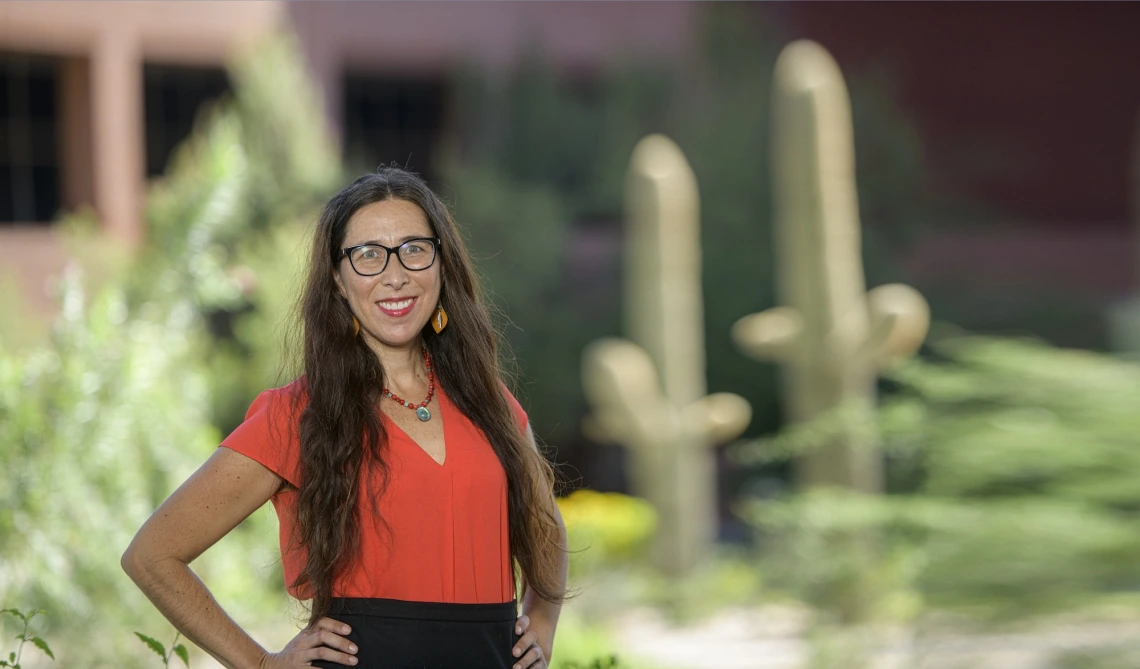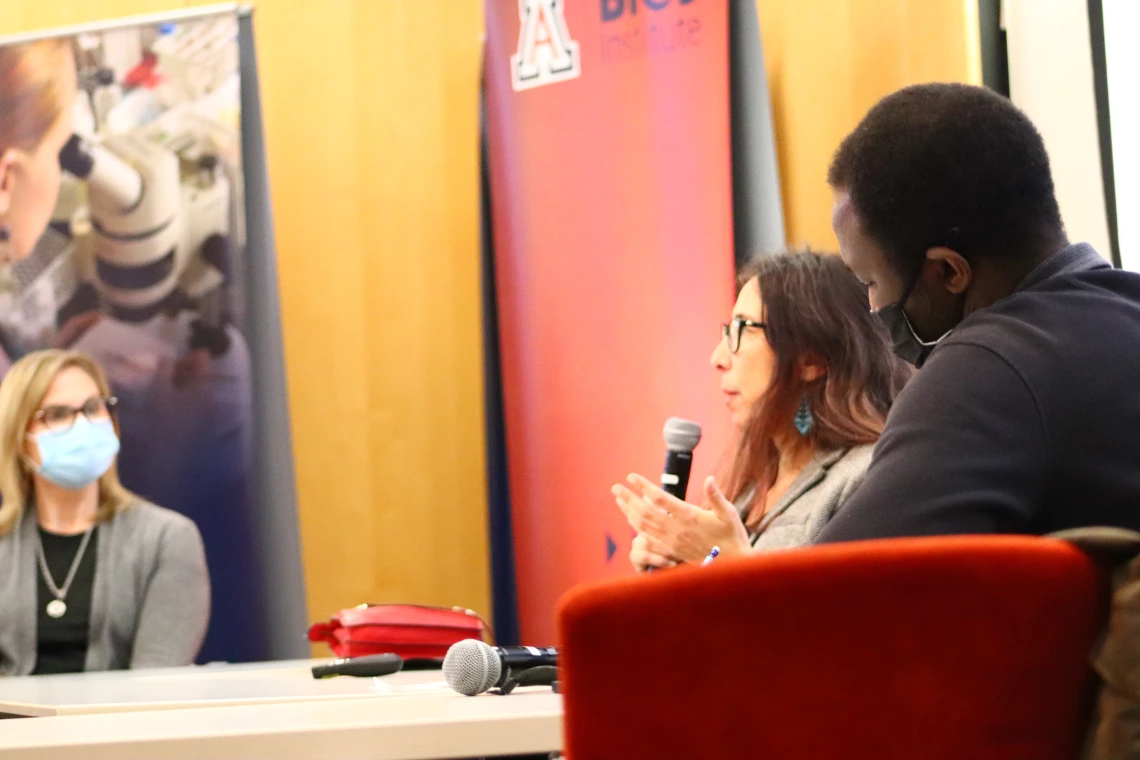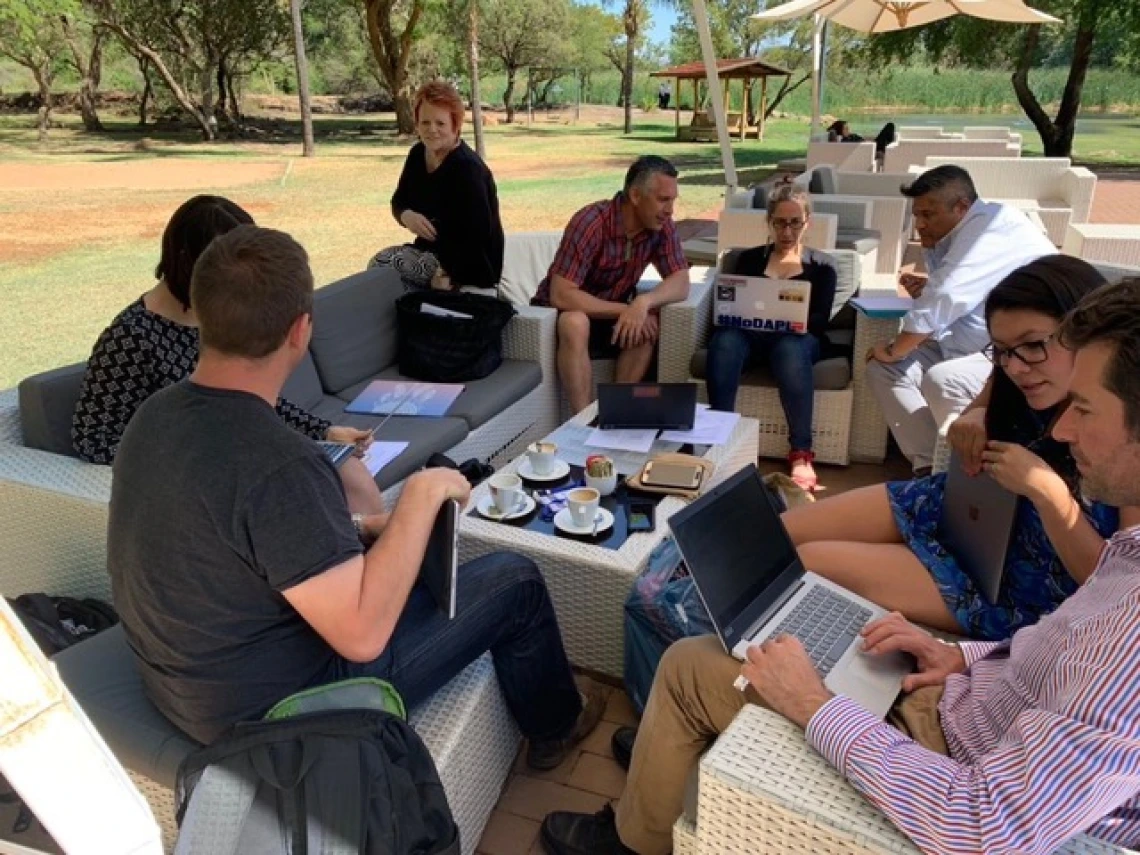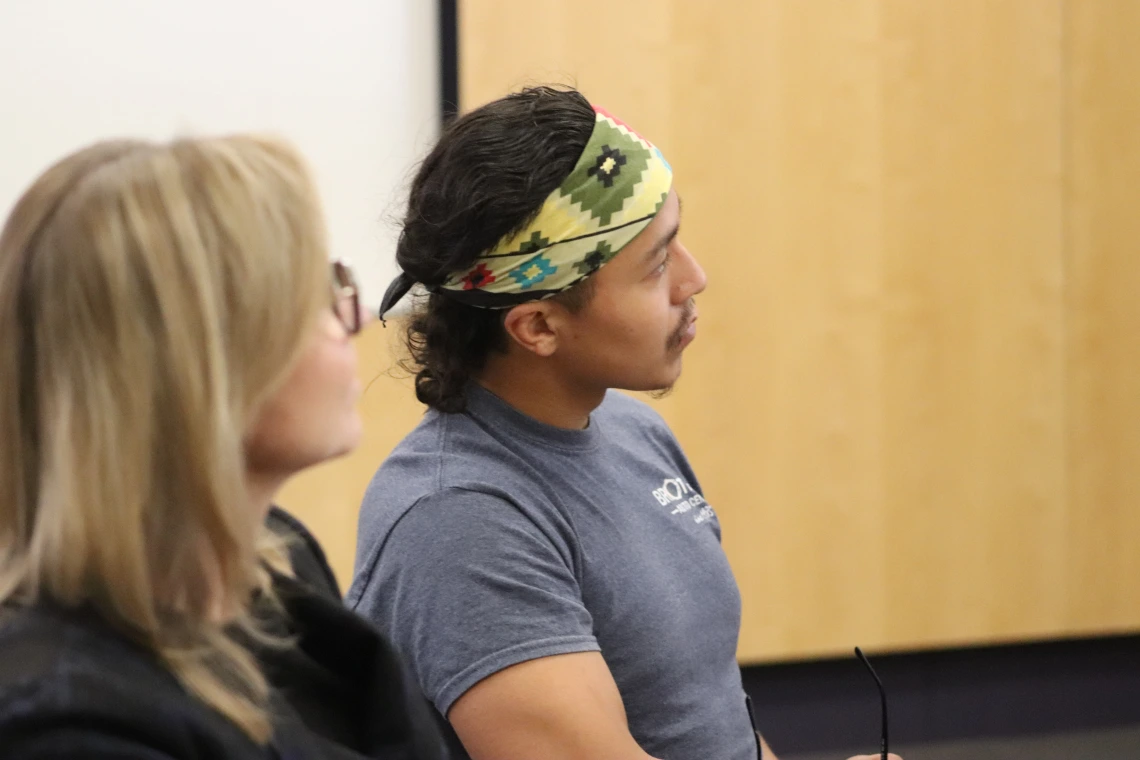UArizona researcher at the forefront of Indigenous data sovereignty
The concept known as IDSov emphasizes Indigenous Peoples' right to control data about their people, lands and cultures. Stephanie Russo Carroll has focused her career on encouraging institutions to adopt policies and practices that recognize that right.

Kris Hanning/University of Arizona Health Sciences
In 2015, Stephanie Russo Carroll was completing her doctoral dissertation at the University of Arizona Mel and Enid Zuckerman College of Public Health. Her research focused on programs run by six Native American tribes in the U.S. to improve the health of their communities.
The work involved compiling data that could be easily compared across all six tribes – birth and death rates, the rates of mothers who were breastfeeding and other figures.
But Carroll – who is Dene/Ahtna, a citizen of the village of Kluti-Kaah in Alaska – struggled to find a single piece of data that could be compared across all six tribes. That was because state agencies and the federal government defined and controlled the data, rather than the tribes themselves, she said.
As a result, her dissertation didn't convey how well the tribes' programs worked, but instead what state governments saw as deficits and shortcomings in tribes' public health needs. And, because not every tribe had good working relationships with state agencies, not every tribe had access to that data in the first place.
"The vast majority of data about Indigenous Peoples are created from somebody else's viewpoint, and to a large degree, they're actually measuring how well colonization is going," said Carroll, who is associate director of the UArizona Native Nations Institute, based in the Udall Center for Studies in Public Policy, and an associate professor in the Zuckerman College of Public Health. "So, there's this deficit lens – the lens of how well we're doing at erasing you – concurrent with the issue of tribes having limited access to their data."
Carroll is a leading expert on Indigenous data sovereignty, which emphasizes that Indigenous Peoples have the right to control the collection, application and use of data about them, their lands and their cultures, whether it originates from research, government programs, corporate efforts or other means. Her experience while working on her dissertation, she said, is just one example of the problems that arise when tribes' data sovereignty isn't recognized.
The vast majority of data about Indigenous Peoples are created from somebody else's viewpoint, and to a large degree, they're actually measuring how well colonization is going.
- Stephanie Russo Carroll
Carrol also teaches students, many from tribal communities, about the Indigenous data governance approach, and she is part of a team of Indigenous faculty who created a Graduate Certificate in Indigenous Health at the Zuckerman College of Public Health.
Much of Carroll's career now focuses on influencing institutions and governments to establish policies, practices and infrastructure that allow Indigenous Peoples to govern their own data. One foundational goal, she said, is to protect Indigenous communities whose basic human rights aren't recognized.
"We have colleagues who work in Latin and South America but also, importantly, in Southeast Asia – places where you can still be killed for being Indigenous or even saying that you're Indigenous," Carroll said. "So, we want to make sure we bring some of these practices into those communities in ways that safely advance their rights."

(From left) BIO5 Institute Director Jennifer Barton, Stephanie Russo Carroll and Ibrahim Garba at an Indigenous Data Sovereignty speaker series event in fall 2022.
What is Indigenous data sovereignty?
Indigenous data sovereignty refers to the sovereign right of Indigenous Peoples to govern the creation, stewardship and use of data about themselves and their lands and culture. The act of that governing is referred to as Indigenous data governance; practitioners often use the terms IDSov and IDGov.
In practice, Carroll said, this often involves incorporating Indigenous knowledge systems – such as oral and written observations or innovations and practices that Indigenous communities have maintained for millennia – into Western data systems. This has become particularly relevant in studies and collections of data related to climate change and biodiversity, where Western researchers have sought to include Indigenous communities' long-held knowledge of cultural and natural resources, Carroll said.
"It really pushes our conceptualizations of data and how we access the data in ways that are meaningful and beneficial to the communities from where they come, and this influences the broader global community conceptions of the same issues," she added.
Indigenous data sovereignty is the latest topic in a long, ongoing conversation about how Indigenous Peoples around the world have fought to keep control over what is theirs, said Ibrahim Garba, a senior researcher at the Native Nations Institute and a frequent collaborator with Carroll. Garba's training spans research ethics, international human rights law and public health policy.
Movements such as Indigenous data sovereignty are most successful when they no longer need to exist, he said.
"At some point, the hope is that there will be changes so that once Indigenous data sovereignty and its principles are adopted, the movement then disappears – hopefully for the reason that those norms have made it into the way research institutions, business entities, mainstream governments and other data actors routinely do business," Garba said.

Members of the Global Indigenous Data Alliance (GIDA) meet at International Data Week in Gaborone, Botswana in November 2018. Much of the early work on GIDA's CARE Principles for Indigenous Data Governance was done during this International meeting.
'As open as possible, as closed as necessary'
Though her academic background is in public health, Carroll has studied and followed Indigenous data sovereignty principles for more than two decades, even before the term was coined by a group of researchers in 2015.
Carroll is director of the Collaboratory for Indigenous Data Governance, a UArizona-based group that works with Indigenous communities to create policies and practices to help them protect their data. She is also a member of the Global Indigenous Data Alliance, or GIDA, an international group of researchers with a similar goal at a global level.
Carroll and her colleagues at GIDA, in 2019, released the CARE Principles for Indigenous Data Governance, which lay out four areas related to collecting, storing and using data:
- Collective benefit: Designing data systems in ways that allow Indigenous communities – not just contributing Indigenous individuals – to benefit from the data.
- Authority to control: Recognizing that Indigenous communities and their governing bodies have the right to control their own data.
- Responsibility: Those working with Indigenous data are responsible and accountable to ensuring the data is used in ways that support Indigenous communities.
- Ethics: Indigenous communities' well-being should be the primary concern at all stages of data collection and use.
Carroll and her colleagues developed the CARE Principles in response to the growing "open science" movement in the research community, which argues that scientific data should be as usable and accessible as possible. Open science is guided largely by the FAIR Principles, which call for data to be findable, accessible, interoperable and reusable. The FAIR Principles were first published in a paper in the journal Nature Scientific Data in 2016, authored by a group of researchers from a range of disciplines.
But the FAIR Principles are often at odds with Indigenous Peoples' rights to own and control their data. The CARE Principles, Carroll said, were designed to complement the FAIR Principles, allowing researchers to consider data accessibility alongside Indigenous sovereignty to protect certain information about, and increase benefits to, Indigenous communities.
A mantra that's become popular, Carroll said, sums up the complementary nature of the two sets of principles: "as open as possible, as closed as necessary."
"The CARE Principles were created to specifically address the people and purpose connected to data," Carroll said, and to make data users ask questions such as: "Why are you doing this? Who are you responsible to? What are the rights and interests around these data?"

Jennifer Barton and Adam Fernandez watch an Indigenous Data Sovereignty talk at the BIO5 Insititute.
Widespread adoption
Since their release, the CARE Principles have been adopted by international bodies, national governments and nonprofits, including UNESCO and the governments in Australia and New Zealand. Denice Ross, U.S. chief data scientist in the White House Office of Science and Technology Policy and a UArizona alumna, is also in touch with Carroll about ways the federal government can implement the principles.
Carroll and others have published articles in several research journals to help the scientific community understand and use the CARE principles across a variety of disciplines, including archaeology, social sciences and genomics.
A recent perspective article in the journal Frontiers in Research Metrics and Analytics, which Carroll co-authored with colleagues from UArizona and around the world, offers guidance on how researchers from a range of disciplines can support Indigenous data sovereignty. Adam Fernandez, a Master of Public Health candidate and Indigenous data sovereignty graduate scholar at the Native Nations Institute, is a co-author on the paper.
Publishing papers like the one in Frontiers, Fernandez said, gives Indigenous communities around the world whose sovereignty hasn't been recognized a resource to refer to in lobbying for other governments to adopt standards and expectations about how Indigenous communities' data should be treated.
"For us to have this literature out there, tribes that may not have any kind of sovereignty over what's going on in their community can use this to say, 'This is what's going on, and we want this as well – this is what we should be doing,'" Fernandez said. "If it's not what they see best for their tribe, they can use it as a starting point and piece together something they can use for themselves."
Carroll is also leading an effort with IEEE Standards Association, an international scientific standard-setting organization led by the Institute of Electrical and Electronics Engineers, to create a recommended practice for how researchers should describe and record the origin of Indigenous Peoples' data. IEEE's standards and practices are taken seriously across a wide variety of disciplines.
Carroll is chair of the working group behind the effort, drafting the practice and organizing meetings to gather input from tribes. IEEE is expected to vote on whether to adopt the recommended practice sometime in 2024.
Each step toward wider adoption, Carroll said, helps Indigenous data sovereignty take hold beyond Indigenous communities.
"One of the real linchpins of Indigenous data sovereignty is that, as rights holders, Indigenous Peoples are the ones who apply, use and advance Indigenous data sovereignty," Carroll said. "But other people have roles because there are a lot of different actors who engage with Indigenous Peoples' data, and they can form these relationships where you learn and adopt then adapt your stewardship to reflect the governance desires of those communities around their data."
For more information on IDSov + IDGov, contact Stephanie Russo Carroll at stephaniecarroll@arizona.edu.

